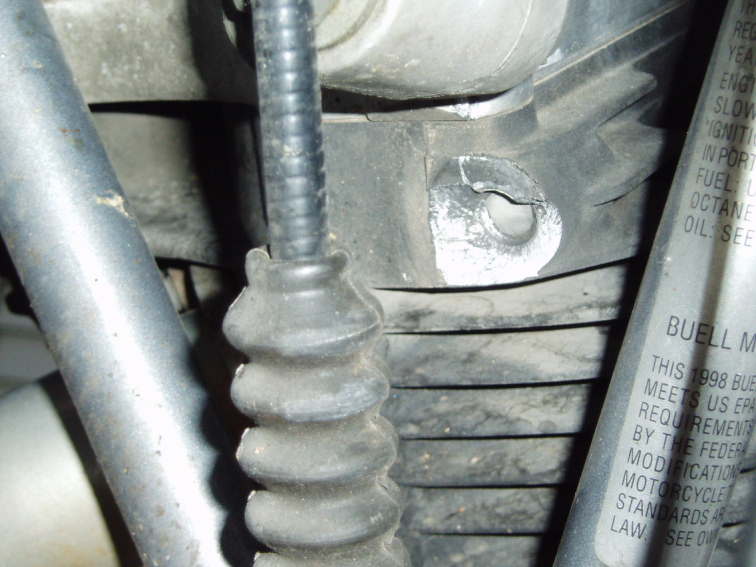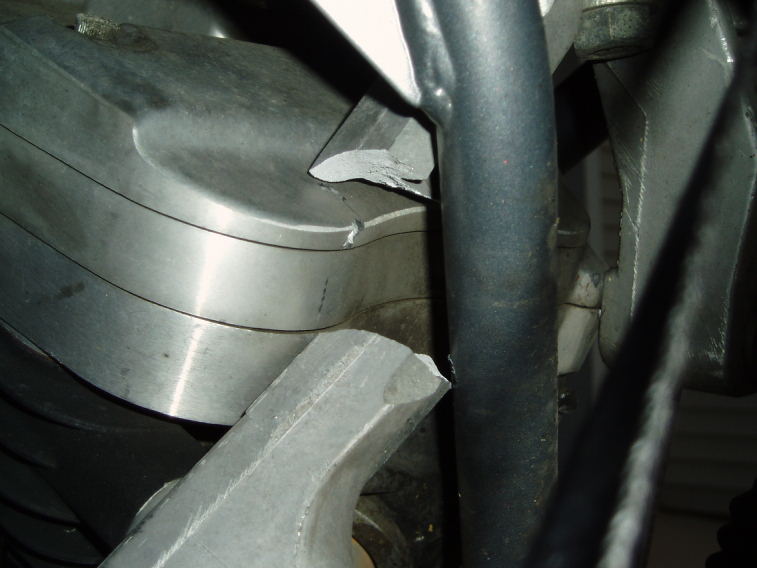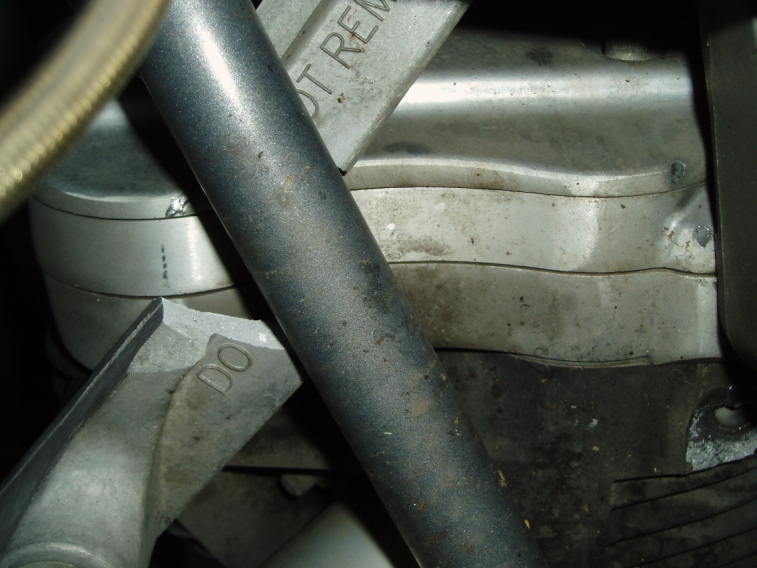| Author | Message | ||
Lake_bueller |
A quick background on the situation... I was riding to work today on my 1998 S3T. Everything was good for the first 17 miles. Then all of the sudden I hear a "ping" and the entire bike starts to shutter. My first thought was that I hit something and blew a tire. I immediately pull off to the side of the road. All the tires look fine. The front brakes are intact. In other words, everything looks fine. I pull back into traffic but the vibration is still there. Because I'm only 2 blocks from work, I proceed to limp into the parking lot. I remove my helmet and start my evaluation of the bike. I spot what I think is the problem:   Yup...that's my left front bolt on the motor mount. Thinking that's the problem, I finish out my day at work and get a ride home from a co-worker. I get home, hitch up the trailer and head back to get the Buell. I load the bike on the trailer and begin securing all the appropriate straps. That's when I see this little suprise:   That, my friends, the a very broken front motor mount. So that brings me back to the subject line... What broke first? the bolt or the mount Oh yeah...has anybody seen this happen before?!?!?!? | ||
99buellx1 |
I've seen the bolt, but not the mount........wow. | ||
Bluzm2 |
Dennis, I'll bet it was the bolt. That's the normal failure mode. You can't really tell by the picture, is the casting pourus (how the hell do you spell that any way?) around the failure area? Seems to me you really dodged a big one.. Yikes! Brad | ||
Newfie_buell |
Looks like the bolt broke, motor shifted forward snapping the mount off the front of the frame. Time for me to check the mounts. | ||
Spiderman |
I may have a spare front head laying around if you need one... | ||
Djkaplan |
Definitely looks like the bolt broke first. Is there any way to tell if the bolt was loose before the failure? Judging by the way it took some of the head with it, I don't think the bolt was loose, but it may have been below the recommended torque setting. Steve Shakeshaft has some professional experience with fasteners exhibiting this failure mode, I'd be interested in his take on the subject. | ||
Xbullet |
the egg! the egg broke before the chicken hatched!! sorry... | ||
Nemesis |
There are much better motor mounts available for these bikes. The stock mounts are very weak. Get a Billet mount. | ||
Oldog |
OUCH! | ||
Bomber |
I'm bettin Bolt first course, NOW you're in deep trouble, as you've removed what is never to be removed -- sorta like the tag on the matress, yes? | ||
Lake_bueller |
Gotta love how it broke between the words DO and NOT. As if I had a choice!!! I'm glad it happened at a very slow speed. Only a few minutes earlier I as cruising at about 75mph in heavy traffic  | ||
Djkaplan |
"The stock mounts are very weak. Get a Billet mount." Why would a billet mount be better if the bolt broke first? I've got a billet mount and I can't figure out how it would keep this failure from happening. | ||
Mikej |
S&S did some re-engineering on these mounts and came up with a design. Don Castro came up with some replacement bolt options a few years ago, Castaloy I think, it's all in the archives. There are other options as well. I have some opinions on the subject and have some plans should either of mine break while I still own them, but I will keep my mouth shut on the subject any further lest I get my teeth kicked in. | ||
Terribletim |
When I first read the post title I was going to say "The Egg!" But that was a different "what was first"!  Seriously, Is it just me or does it look like a part of the engine case came off with that bolt? My question would be "Can you put a new bolt in there now?" What good is a new engine mount if you can't mount it? But, like Bomber said - you've removed what is never to be removed, now you're screwed!  I'm with everyone else, bolt broke, then engine rocked over and broke the mount. I'm with everyone else, bolt broke, then engine rocked over and broke the mount. | ||
Lake_bueller |
The head can be repaired. But I'll probably just replace it. Looks like another partial top-end rebuild. New valves in front & back plus new gaskets. I'll also replace the front isolator. | ||
Djkaplan |
For your consideration... http://www.badweatherbikers.com/buell/messages/476 23/285470.html?1182343105 ... not saying it's the answer, though. I think even stronger bolts may be the real answer based on the graphic evidence of your failure, but who really knows? | ||
Etennuly |
Sumbich got so much power it is finally finding its way out of there!  Looks like you might have to grind a flat spot where the cast piece broke off, unless that would leave your bolt hole too shallow. You could maybe drill, pin and epoxy the piece back on.  Use it kinda as a shaped washer surface to tighten against....... Just throwing out an idea. Use it kinda as a shaped washer surface to tighten against....... Just throwing out an idea. Good luck with that! | ||
Sleez |
most sure the bolt broke first, there have been a number of instances where the bolt ONLY broke, but not one instance where the bracket only broke. my bolt broke first, and i caught it before the bracket broke. i feel the billet brackets help distribute the load between the two bolts more evenly because they are triangulated. (the two bolts that go into the head have a tie bar between them) this is most likely the key as there has been no broken brackets of the triangulated style, even though there has been some broken bolts with the earlier triangulated bracket before they went to the upgraded bolts. although...i have a feeling that the bolts themselves might be the culprit, they are plated/treated by someone other than the bolt manufacturer, i spoke with them and the bolts as shipped are black. no plating. they are heat treated to around 760 deg, and i am sending them a bolt from the other side of the bracket to examine, to discover if the plating process could contribute to the failure. hope this makes sense...i have been spouting it for months! | ||
Court |
If you do replace the head, I'd like to see the head with the broken part of the bolt unmolested. I **think** (it's a long shot guess until someone with the proper data investigates) that the bolt went first and the bracket was a result of the bolt failure. The bolt failure is understood. I'm not aware of any mount failures. The stock mount has provided excellent service. There are indeed some very robust and pretty aftermarket units that work just as well. Court | ||
Fullauto |
Your photos look the same as mine. My mount snapped in the same spot. I've just got my '99 X1 on the road again this morning with a billet NRHS mount and a new bolt kit. Not a tough job, just a bit squirrelly with only two hands.Luckily my broken bolt came out with not much grief. Court, I've got the bolt head intact if you want me to post it to the US for you. PM me. Ken | ||
Oldog |
Are you thinking Hydrogen embrittlement Sleez? On a side note, I noticed a ridge on my casting it would be near the break point on Lakes mount Fullauto was there a ridge on your broken mount on or along the break line? (Message edited by oldog on June 23, 2007) | ||
Tommy_black_shark |
Ouch! But I guess in the end you were lucky to be going slow. My '41EL (formerly Daddy_Black_Shark's) has a broken motor mount that was professionally welded and has worked without problem since the early '60's. | ||
Sleez |
oldog, possibly! http://www.mechanicalplating.com/hydrogen.htm interesting reading; Hydrogen embrittlement is not completely understood; however, it is generally agreed that only atomic hydrogen will enter and diffuse through a steel, in this case during corrosion. Whether absorbed hydrogen causes cracking or not is a complex interaction of material strength, external stresses and temperature. At high strength levels (180 ksi/1241 MPa) only a few ppm of dissolved hydrogen can cause cracking. We have recently analyzed fasteners where failure was attributed to hydrogen embrittlement cracking. A common denominator in the failures is that the fasteners had been in service many years before failure. Macroscopic evidence of hydrogen embrittlement normally includes a rough, brittle-appearing fracture surface, usually with a single origin, although multiple fracture originscan be present. Fractures typically occur in corroded thread roots. Another characteristic of hydrogen embrittlement cracking is that fractures do not necessarily occur in the last engaged thread as do fatigue fractures. In fact, fracture can occur inside the nut. SEM examination of fracture surfaces typically show intergranular crack origins, with the final fracture areas exhibiting any combination of intergranular, cleavage, or ductile overload features. Metallographic examination of failed fasteners will normally not show any secondary hydrogen cracks, although subsurface cracking at inclusions has been observed. The fasteners at most risk of hydrogen embrittlement cracking are high strength studs and bolts, such as those manufactured to ASTM Standards A354 Gr. BD, A490, and socket head capscrews manufactured to ASME/ANSI 18.3 and A574. These standards specify greater maximum allowable hardnesses than other common fastener specifications, i.e., A325, A193, A307 and A449. A193 Gr. B7, a common fastener alloy, does not have a maximum hardness requirement; however, a minimum 1100F (593C) tempering temperature is specified which should result in nominal hardnesses of 25 HRC to 30 HRC. Socket head capscrews have a specified hardness range from approximately HRC 39 to HRC 45 and are typically heat treated to hardness levels greater than 40 HRC. Therefore, they are susceptible to HE at their minimum hardness range. i'd love to have the stump of the broken bolt examined, but i do not want to sacrifice my cyl head to do it. i can't think of another way of removing the broken bolt without damaging the evidence!!! (Message edited by sleez on June 25, 2007) |